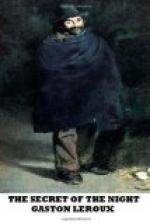“Me! By the living God!” babbled Matrena Petrovna desperately. “If I had been able to keep this from you, Jesus would have been good! But I say no more to crucify you. Feodor Feodorovitch, question your daughter, and if what I have said is not true, kill me, kill me as a lying, evil beast. I will say thank you, thank you, and I will die happier than if what I have said was true. Ah, I long to be dead! Kill me!”
Feodor Feodorovitch pushed her back with his stick as one would push a worm in his path. Without saying anything further, she rose from her knees and looked with her haggard eyes, with her crazed face, at Rouletabille, who grasped her arm. If she had had her hands still free she would not have hesitated a second in wreaking justice upon herself under this bitter fate of alienating Feodor. And it seemed frightful to Rouletabille that he should be present at one of those horrible family dramas the issue of which in the wild times of Peter the Great would have sent the general to the hangman either as a father or as a husband.
The general did not deign even to consider for any length of time Matrena’s delirium. He said to his daughter, who shook with sobs on the floor, “Rise, Natacha Feodorovna.” And Feodor’s daughter understood that her father never would believe in her guilt. She drew herself up towards him and kissed his hands like a happy slave.
At this moment repeated blows shook the veranda door. Matrena, the watch-dog, anxious to die after Feodor’s reproach, but still at her post, ran toward what she believed to be a new danger. But she recognized Koupriane’s voice, which called on her to open. She let him in herself.
“What is it?” she implored.
“Well, he is dead.”
A cry answered him. Natacha had heard.
“But who — who — who?” questioned Matrena breathlessly.
Koupriane went over to Feodor and grasped his hands.
“General,” he said, “there was a man who had sworn your ruin and who was made an instrument by your enemies. We have just killed that man.”
“Do I know him?” demanded Feodor.
“He is one of your friends, you have treated him like a son.”
“His name?”
“Ask your daughter, General.”
Feodor turned toward Natacha, who burned Koupriane with her gaze, trying to learn what this news was he brought — the truth or a ruse.
“You know the man who wished to kill me, Natacha?”
“No,” she replied to her father, in accents of perfect fury. “No, I don’t know any such man.”
“Mademoiselle,” said Koupriane, in a firm, terribly hostile voice, “you have yourself, with your own hands, opened that window to-night; and you have opened it to him many other times besides. While everyone else here does his duty and watches that no person shall be able to enter at night the house where sleeps General Trebassof, governor of Moscow, condemned to death by the Central Revolutionary Committee now reunited at Presnia, this is what you do; it is you who introduce the enemy into this place.”




